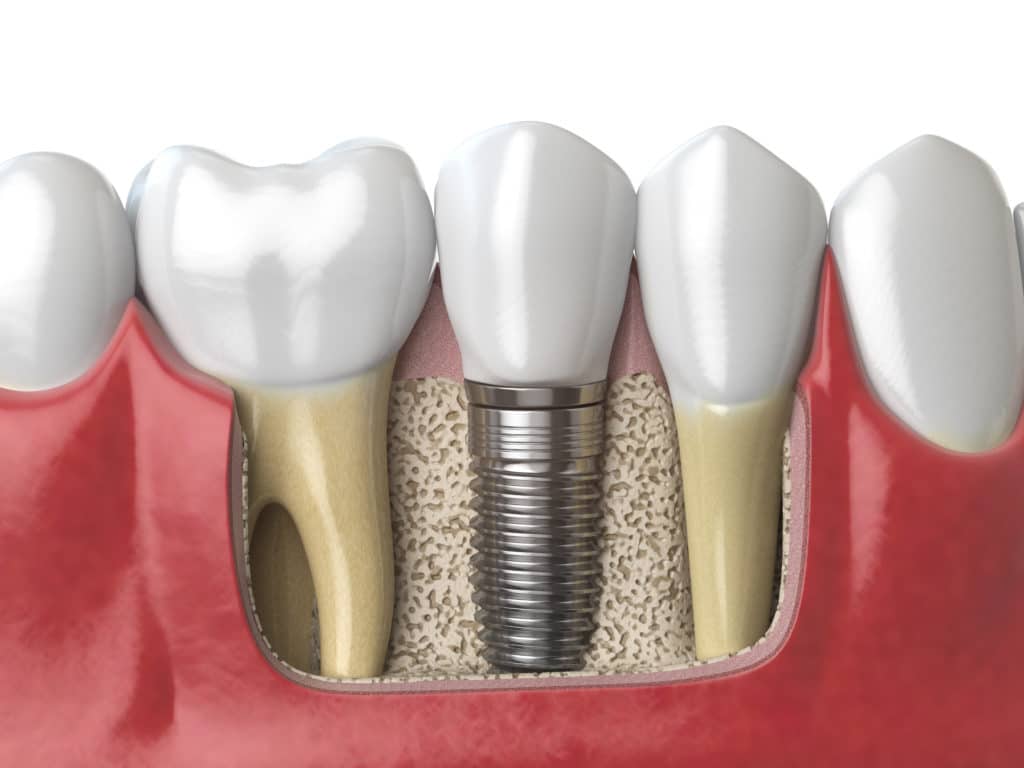Dental Implants in Golden, CO
At Golden Dental Solutions, we understand that tooth loss can cause functional, cosmetic, and emotional damages. If you have lost a tooth or one or more teeth that are badly damaged and could use replacement, we offer a wide variety of options. Our dentists provide exceptional care that revolves around your health and wellness. This is one of many reasons we are proud to offer dental implant treatment. Dental implants have become increasingly popular in recent years because the insertion of mini dental implants into the jawbone restores nearly 100 percent of your natural form and function. If you want your smile, comfort, and confidence back, consider getting dental implants from Golden Dental Solutions.
What Are Dental Implants?
Dental implants actually get their name from the base of the prosthetic. The titanium “implant” is shaped like a screw, and is placed down into the hole formerly occupied by your natural tooth root. The jawbone then actually grows around the implant, making it a part of the jaw. A post is attached to the implant and a porcelain artificial tooth is attached to the post. Because the implant is anchored into the jaw permanently, your new replacement tooth feels, functions, and looks just like a natural tooth.
Why Replace Missing Teeth with Dental Implants?

- When a tooth is missing, the teeth on the sides of the gap tend to slide over into the hole. This creates problems with your bite and the alignment of your teeth. Your teeth remain in place due to pressure from the adjacent teeth.
- You don’t think about it, but chewing and biting creates an enormous amount of energy. That energy transfers down through the teeth into the jawbone beneath them. That energy stimulates the jawbone to shed old cells and create new bone mass; this keeps the jawbone healthy and strong. When a tooth or a couple of teeth are missing, the jawbone doesn’t receive that energy, and it immediately begins to “resorb.” This deterioration is why people missing many teeth often look sunken as if their jaw collapses backwards.
- Missing teeth may be embarrassing and they can create whistling sounds when pronouncing certain words. If you’re missing a molar, you may not be able to eat certain foods, such as nuts, which can create nutritional deficiencies.
We believe replacing a missing tooth with a dental implant is the best long-lasting solution. At Golden Dental Solutions in Golden, CO, Dr. Dallas Kenson has extensive training and experience in placing dental implants.
What are the advantages of dental implants?
Dr. Dallas Kenson at Golden Dental Solutions is a big fan of dental implants for tooth replacement for the following reasons:
- Dental implants behave exactly like a natural tooth, so the patient can eat any food and chew normally.
- Unlike bridges, where adjacent “abutment teeth” need to be crowned to anchor the bridge holding the false tooth or teeth, implants stand alone.
- Implants keep adjacent teeth from moving.
- Implants are load-bearing teeth, so you don’t have to avoid chewing or biting with them. Plus, they transfer energy down into the jawbone just as natural teeth do.
- Implants have a 90 to 95% success rate and can last for decades, giving the patient back his or her smile and the ability to eat any food.
Who Makes A Good Candidate for Dental Implants?
For a dental implant to successfully anchor into the jaw, the patient needs to have sufficient jawbone mass and density. As mentioned above, if you’ve been missing the tooth or teeth for some time, you may have suffered a loss of bone mass in the jaw. If that has happened, then there may not be adequate bone to support the implant. For these patients, Dr. Kenson can use bone grafting to build up the jaw to make it ready for an implant.
Otherwise, as long as you don’t have other oral health issues, such as gum disease, everyone is a great candidate for a dental implant.
How Are Dental Implants Placed?
Implants aren’t placed in a single appointment. They require the following process:
Consultation
The implant process begins with an initial consultation with Dr. Kenson, who performs a full oral exam and takes x-rays and a CT scan to determine your jawbone mass.
Placement
Next the titanium implant is placed into a hole formerly occupied by the tooth root. Dr. Kenson may have to drill a small hole into the jawbone to prepare it. The implant is shaped like a screw and is inserted in that fashion.
Osseointegration
Now the patient simply waits three to six months as the jawbone naturally grows around and accepts the titanium implant.
Abutment
When the jawbone has fully grown around the implant, a small metal post, called an abutment, is attached to the implant and the gum tissue is allowed to heal for around six weeks.
Placing the crown
The final step is to place a custom-made porcelain crown onto the abutment. The crown is made to match the color and shape of the surrounding teeth so, once placed, it fits in naturally.
How to Care For and Maintain Your Dental Implants
Because your implant is a part of your jaw, it behaves exactly like a natural tooth, and your home hygiene reflects that. Daily brushing and flossing are all that is needed. Patients with dental implants should be on top of setting up their twice-yearly professional cleanings. It is important to maintain the implant and ensure that the gums are well adjusted to the implant.
When Can I Return to a Normal Diet After Implant Placement?
During the healing of the gums after the implant placement and after the abutment placement, you will need to be careful where the gums are healing. You need to eat a soft diet for a few days, but then can return to a normal diet chewing only on the opposite side. We’ll give you full instructions on how to care for your gums during these times.
Once Dr. Kenson places the porcelain crown/artificial tooth you’re good to go. You can go eat whatever you want immediately. Your new dental implant will allow you to chew and bite just as you would with a natural tooth.
What Do Dental Implants Look Like?
The false tooth/crown that is attached to the post is made of dental porcelain. It is created to match the natural tooth that was in that position of the mouth. Porcelain has the same translucence as natural tooth enamel in the way it absorbs some light and reflects some light. This will make your dental implant indistinguishable from the surrounding natural teeth.
Are Dental Implants Permanent?
Once they are fully integrated into your jawbone, dental implants are incredibly strong and durable. They are a part of your jaw. As long as you don’t develop gum disease and subsequent jawbone loss down the road, your dental implant can last for decades, often for the life of the patient. Also, even if your porcelain crown breaks or needs replacement, a new artificial tooth is simply attached to the post on the implant, a simple process.
Are Dental Implants Painful?
People assume there is a good deal of pain with the implant procedure, but this isn’t the case. Thanks to anesthesia, there is not any pain during the procedure phases. Afterwards, there is some discomfort when the gums recover after placement of the implant and again when the gums heal after the post is placed, but this is manageable with over-the-counter pain medication.
Otherwise, the main effect is some aching when the implant is placed. Most patients equate the aching to having a tooth extracted or having a root canal.
Tooth loss has functional, cosmetic, and emotional implications. If you have lost a tooth or have one or more teeth that are badly damaged and could use replacement, you have options. Our dentists provide care that revolves around whole-body health and wellness. This is one of many reasons we are proud to offer dental implant treatment. This tooth replacement process has become increasingly popular in recent years, and we know why. The insertion of tiny dental implants into the jawbone restores nearly 100 percent of your natural form and function. If you want your smile, comfort, and confidence back, consider dental implant treatment.
Will My Dental Implants Look Natural?
Yes. The results of dental implant treatment look natural and feel natural. When teeth are replaced with dentures or a bridge, there is often an area of artificial gum tissue that may be seen in the smile. Dental implants are completely out of view. No one can tell that you have dental implants by looking at your teeth. Then, we carefully select materials for crowns, bridges, and dentures with consideration of their strength and appearance. Many modern dental materials mimic the nuances of natural enamel, from shade to translucency. With the extra care that we put into dental implant treatment, patients can enjoy a smile that looks and feels brand new.
Are There Any Risks Associated With Dental Implants?
Dental implant treatment involves a minor surgical procedure to insert the titanium posts into the jawbone. As a surgical procedure, this treatment does carry some inherent risks. That said, it is rare for complications to occur, and, should one develop, we know how to address it efficiently. Some of the risks that we discuss with patients during their consultation include infection at the implant site, implant rejection, sinus problems, and injury to the jaw, blood vessels, or teeth. These risks are reduced through extensive training, clinical practice, and the careful performance of each case.
Will I Need Sedation For The Dental Implant Procedure?
Our patients undergo the dental implant procedure without sedation and also without stress. The primary reason patients lean towards dental sedation is to alleviate anxiety and fear, usually related to the expectation of pain. Our team is keenly aware of the effect that this expectation can have on a patient’s well-being. To facilitate comfort and peace of mind, we have learned a number of pain-management strategies. For example, when you schedule your dental implant procedure, we may suggest that you avoid coffee and certain other substances on the morning of your visit. We may also suggest that you take Tums starting a few days before your appointment. This sneaky strategy is known to enhance the effects of the local anesthetic administered before treatment. Above all, we take our time to understand the perceptions you may have about the dental implant procedure and to offer you the support you deserve to feel comfortable throughout your treatment process.
Will I Be Able To Drive After My Dental Implant Procedure?
Because the dental implant procedure is performed using only a local anesthetic, your primary side effects will be a sensation of numbness and maybe some mild soreness. Many patients feel perfectly comfortable driving themselves home after their procedure. While you can do so safely, you may want to have a loved one accompany you to your appointment so that you may sit back and rest on the way home.
Are There Alternative Treatments to Dental Implants?
Yes, there are alternatives to dental implants. Some patients missing more than one or two teeth may not want to go with a series of dental implants. In these cases, a dental bridge can be used to replace the teeth. A bridge places crowns on the healthy teeth on each side of the gap. These crowns are then connected to the false teeth serving as replacement teeth. Bridges are not as strong as implants, and they usually have a lifespan of 10-20 years. For an even longer series of missing teeth, a patient can use a partial denture. If possible, we like to anchor these partial dentures with an implant or two.
Why Should You Choose Golden Dental Solutions?
Our team of individually trained and experienced staff members are committed to providing you a comfortable and pleasant experience with high quality dental care. We understand how important it is for you to look and feel your best, which is why we are dedicated to hearing your wants and needs to create your perfect smile!
Schedule a Dental Implant Consultation Today!
If you are interested in dental implants and would like to see if you are a good candidate, call Golden Dental Solutions in Golden, CO, at 303-277-9600 to schedule a consultation with one of our experienced and compassionate doctors. Our practice serves patients from Denver, Golden and surrounding areas.

Our Office Would Love to Hear From You!
If you have any questions about the services we offer or would like to schedule an appointment, please call us today at (303) 277-9600

 5 Stars from over 200 reviews!
5 Stars from over 200 reviews! 


